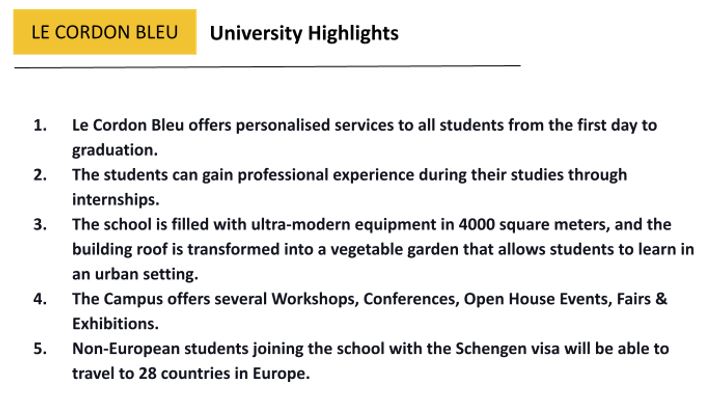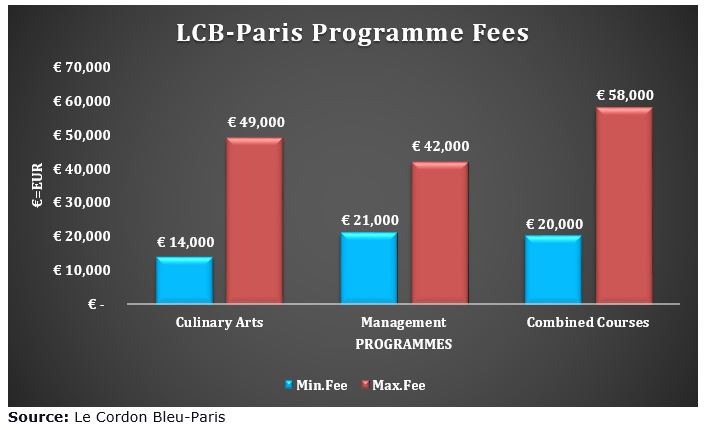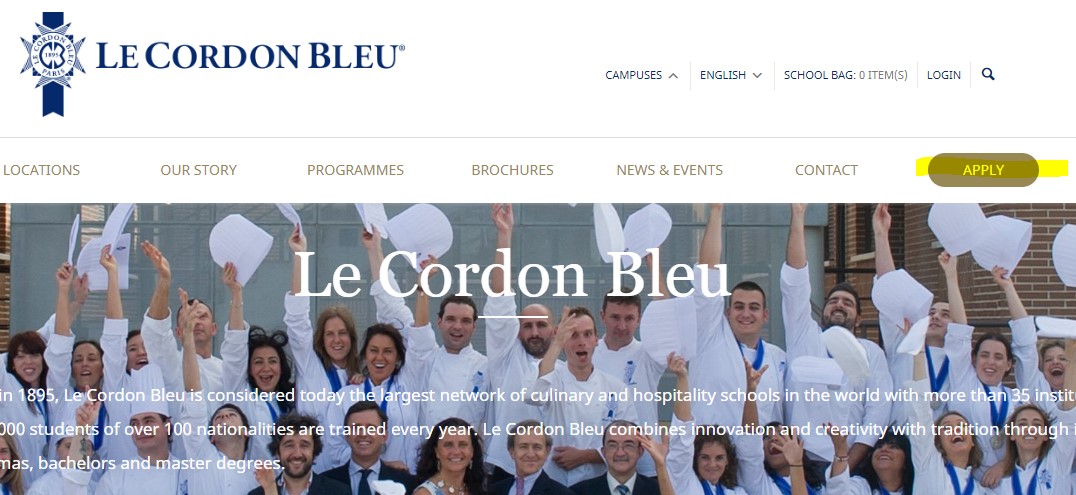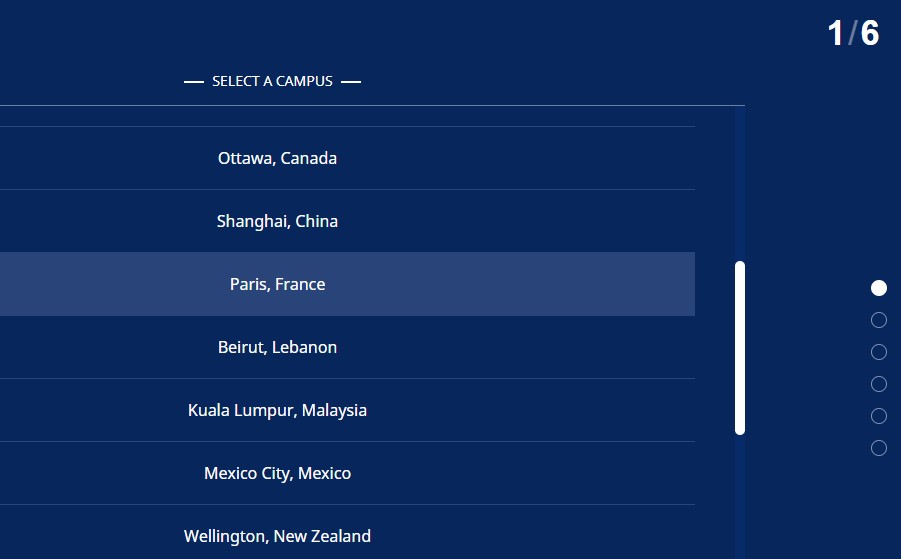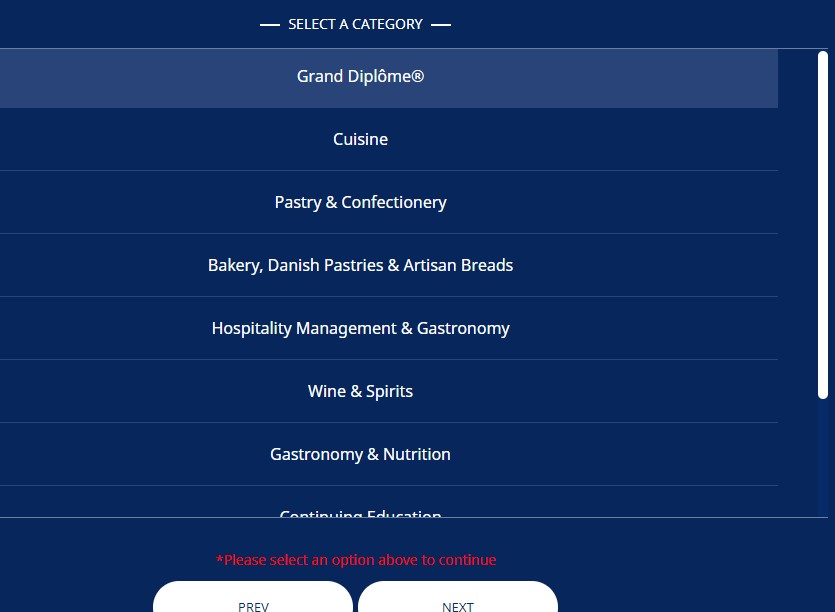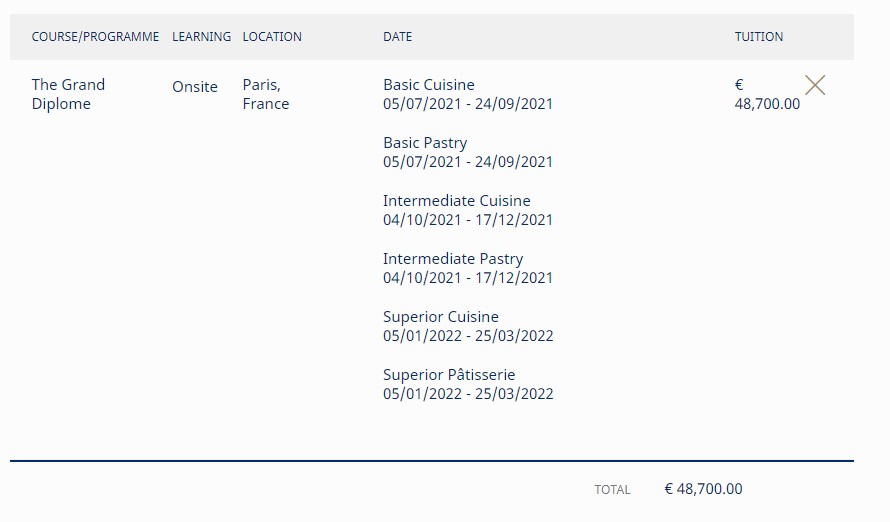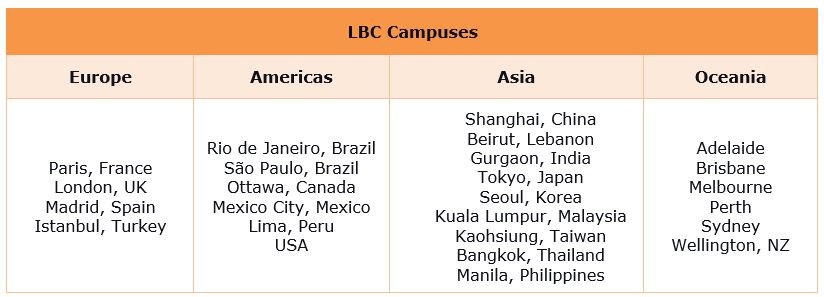

Le Cordon Bleu - Paris Admissions 2025: Application Deadline, Requirements & Costs
LCB AdmissionsWhat’s new?
Le Cordon Bleu-Paris (LCB) has been at the fore-front of revolutionary change over the past years in the field of Culinary Arts and Techniques. It evolved from a regular Parisian cooking school to a global network of culinary arts and hospitality institutes. So far, LCB has established in 35 international schools in 20 countries. It achieved excellence through constant practice, and eventually developed to meet the modern culinary and hospitality industries' needs.
Students coming to the Le Cordon Bleu are provided with a superior and well-rounded education in less time to make them succeed in today's competitive world. The institute’s Master Chefs are from Michelin-starred restaurants and winners of prestigious competitions. Considered to be the guardian of French culinary technique through its culinary programmes, LCB has continued to preserve and pass on the mastery and appreciation of the culinary arts that have been the cornerstone of French gastronomy for over 500 years.
Although Le Cordon Bleu's primary focus is on providing higher education, they have taken a particular interest in the public realms like fine restaurants, bakeries, and coffee shops under the Le Cordon Bleu trademark.
Courses Offered
What all courses are available to international students?
LCB strives for successful careers in a wide variety of fields, including restaurant kitchens, catering, restaurant and hotel management, journalism, consulting, food service, food styling, and education. It offers a wide range of Culinary Arts, Wine, Management, and Hospitality programmes, such as:
- Grand Diplôme: An intensive and comprehensive programme in classic French culinary techniques, combining our Diplôme de Pâtisserie and Diplôme de Cuisine, Le Grand Diplôme is considered the passport to a world of career opportunities.
- Cuisine: Students can master basic to advanced culinary techniques that apply to any style of cuisine (French culinary traditions, global cuisines, and current trends).
- Pastry & Confectionery: This includes courses ranging from specialized ateliers, basic through advanced levels of pastry to confectionary craft making, plated and boutique style desserts.
- Bakery, Danish Pastries & Artisan Breads: Students learn typical French bread making techniques and processes for making bread. Specialties like Danish, regional, and artisan breads and how to apply advanced yeast production methods are also taught here.
- Hospitality Management & Gastronomy: Programmes that allow students to learn about running their own Hotel or Resort, Restaurant, Café or Boutique business. The certificate programmes instill operational, supervisory and management knowledge, skills and application in the hospitality and food industries.
- Wine & Spirits: These programmes provide training with specific focus in various alcoholic beverages in order to best appreciate and serve them. Courses range from initiation modules to Food and Wine Pairing to Wine Management.
- Cuisines of the World: A custom designed range of specific programmes themed around local cuisines or specific topics using the same teaching method as its core and focus on practical approach.
- Gastronomy & Nutrition: Students can explore Gastronomy through practical culinary skills alongside the principles of Nutrition.
- Culinary Arts & Business: For students interested in creating, practicing, and managing a world-class culinary business in a globally competitive environment. These innovative programmes focus on developing knowledge and appreciation of fine food and wine in a ‘farm-to-plate’ context and how this can be successfully applied.
- Continuing Education: A range of culinary and higher education programmes are offered to expand one’s knowledge, create opportunities, advance careers or take them in new directions, enhance skills, and encourage new ways of thinking and understanding.
- Gourmet & Short Courses: For beginners, gourmet enthusiasts or those wanting to be the best house party host, a wide range of courses have been designed to satisfy the time and budget conscious.
- Cheese: From beginners to professionals, students can study a diverse range of topics from cheese history and culture, production methods, and pairing cheese with wine and other beverages.
- Tourism, Conventions & Events: Students can learn all about the tourism industry.
Other programmes such as Les Petits Cordons Bleus (for children), online courses (accredited and non-accredited), and courses in Food Safety are also available.
Eligibility & Documents Required
What are the eligibility requirements?
LCB has different eligibility requirements as per the programme and course. International students need to either showcase French or English language proficiency scores, as per the course. However, most courses are taught in French and very few courses available in English-medium. Given below are some of the admission requirements for famous programmes/courses.
Bachelor of Business (International Hospitality Management or Culinary Arts Management)
For UG Business degree, international students must hold a bachelor’s degree or its international equivalent and must be at least 18 years of age at the time of admission. The maximum age limit is 28. Along with this, English proficiency test scores are required (any one):
UG Diplomas
Applicants should be at least 18 years of age at the beginning of the programme and hold a high school diploma or a bachelor’s degree (or equivalent). Since these are taught in both French and English, depending on the course, students would need to fulfill the French/English proficiency requirements. Generally, LCB expects international students to obtain an A1 level in French as A2 level is taught during the practical application, which the student has to complete before the internship.
Read: DELF and DALF
MBA Programmes
All MBA programmes require an undergraduate degree (three-year) or its equivalent along with three year’s of professional experience using management skills. Any one of these English proficiency scores are required:
- IELTS: 6.5
- TOEFL iBT: 80
If you wish to know about other courses, download the respective programme guides here.
What all documents are needed for application?
Documents required depends on the programme and course you have selected. However, generally, the following documents are required as per study level.
For UG
- High school diploma or undergraduate degree
- Official transcripts
- Language proficiency score report
- Essay or Statement of Purpose (SOP)
- Letters of Recommendation (LORs)
- Resume
- Copy of passport
- Financial documents
For PG
- Undergraduate degree/diploma
- Transcripts
- Language proficiency score report
- LORs
- Resume
- Cover letter of 300-500
- Letter of Motivation
- Copy of passport
- Financial documents
Application & Tuition Fees
Is there any application fees?
The application fees differ as per programmes, which are non-refundable.
| Programmes |
Application Fees (in EUR) |
|---|---|
| Bachelor of Business |
200 |
| Wine Management |
200 |
| Cuisine Grand Diplôme/Diploma |
1,500 |
| Certificate Cuisine: Basic, Intermediate and Superior |
500 |
| Certificate Pastry: Basic, Intermediate and Superior |
500 |
| Pastry Grand Diplôme/Diploma |
1,500 |
| Certificate Boulangerie: Basic and Advanced |
500 |
| Boulangerie Diploma |
1,500 |
What is the fee structure of courses offered by the university?
LCB’s programme fee includes tuition fee for all semesters, application fees, course content, uniform, equipment, and activities such as visits. For 2020, LCB-Paris declared the following fees for these programmes:
Note: Tuition and other charges are subject to rise without notice with each academic year. We encourage you to check the official website for current year’s fee structure.
Scholarships & Financial Aid
Is there any scholarship or financial aid available for international students?
Le Cordon Bleu offers scholarships for students of all nationalities through the James Beard Foundation, an American culinary association. Through this foundation, it has awarded financial aid of USD 8 million to over 2,000 recipients till now. This scholarship is for culinary students who plan their education at any accredited schools, colleges, or universities including the LCB. For more information on this, check the official website.
Admission Process
When do the admissions start?
There are different intake dates for culinary arts and management programmes. You have to start applying to the programmes at least eight weeks before the start of the programme. You can check the availability of courses before applying with the respective admissions department. LCB also recommends international students to not wait until the deadline because they require a visa for France and the waiting time for a visa can be extended (up to three months).
Culinary Arts Programmes
| Terms |
Intake |
|---|---|
| Term 1 |
Early-January (Standard and Intensive) |
| Term 2 |
Early-April (Standard) |
| Term 3 |
Early-July (Standard and Intensive) |
| Term 4 |
Early-October (Standard) |
Management Programmes
| Programmes |
Intake |
|---|---|
| Wine and Management Programme |
Early-September |
| Bachelor Programme |
Mid-September |
Note: The intake dates and deadlines vary depending on the course and can change eventually. We encourage you to check the school/department’s website for exact deadlines.
How to apply to UG and PG courses?
International students can apply to LCB either electronically, through e-mail, or through post.
E-mail or Post
If you are planning to apply through mail, then each programme and course have a different application form. You need to download the correct application form and send it to parisadmissions@cordonbleu.edu. If you want to post it, send the complete application docket to the following address:
Le Cordon Bleu Paris, Service Admissions,
13-15 Quai André Citroën 75015
Paris, France
Online Application Process
You can apply online by clicking on the ‘Apply’ button present on the website.
Step 1: Upon clicking, you can see a list of campuses. From the list you have to select a campus as shown below.
Step 2: Accordingly, you have to select the category and course from the list, and then you have to choose a date to apply (intake).
Step 3: Review your selection, add to bag, and proceed for checkout.
Step 4: Review your fees and login to submit the necessary documents before making the payment.
When will I hear from the university after I submit my application?
The Admissions Jury examines the candidates who meet the admissions criteria within ten days. If you are selected, the Jury will send the following documents:
- Admissions offer
- A form for paying the tuition fees
- Le Cordon Bleu school's constitutional rules
- Helpful information regarding Visas and Housing
Student Diversity & Preferred Profile
What are the chances to get into this university?
The admission rate of LCB is quite high (75-100%) as it usually accepts all student applications that meet the eligibility requirements. Since each programme has a limited number of seats, students are advised to apply well in advance and wait until the deadline. Also, do note that the institute may not confirm your admission and put you on a waitlist. To confirm your admission, make your fee payment on time and register for the course as per the instructions.
How many Indian/international students are studying at the university?
LCB hosts over 20,000 students from more than 100 nations every year. It has 18 university partnerships and 35 institutes in 20 countries and 130 nations. Through its international faculty of Le Cordon Bleu Master Chefs and industry professionals, LCB applies its distinctive teaching methodology where students gain experience through hands-on learning. Hence, it is one of the most-sought-after culinary schools for professional chefs and future entrepreneurs.
Part Time Work While Studying
Can I work while studying here?
Several Le Cordon Bleu students work while studying to finance their education and gain experience. For international students, a special visa is required to work legally in France. If you own a student residence permit for an extended period, it permits you to work during your studies in France. The students are allotted 964 hours per year to work. You do not need any form of authorisation. The work permit is required in the following three cases:
- If you are an Algerian student
- If you need to work for more than the authorised amount of time
- If you own a temporary six-month visa
Some programmes include paid-internships for which applicants do not need to any special permissions. For more information on this, visit the LCB website.
Campuses & Accommodation
How many colleges and campuses does the university have?
Le Cordon Bleu has several campuses all over the world (including the Paris campus), such as:
Is on-campus housing available?
There are no on-campus housing options available to the students. You have to organise accommodation by yourself before arriving in France. You can find information for apartment and studio rentals around the campus through the internet. A list of housing agencies and hotels is also available to all registered students.
University Contact Information
Whom should I contact in case of any doubts?
If international applicants need any further information or clarify their queries/doubts, they can contact the university:
Website: www.cordonbleu.edu/paris/home/en
E-mail ID: paris@cordonbleu.edu
Phone: +33-(0)-1-85-65-15-00
Address: 13-15 Quai André Citroën, Paris, 75015, France
LCB
Student Forum
About the author
 Main Building
Main Building Inside Campus
Inside Campus Classroom
Classroom

LCBContact Information
13-15 Quai Andre Citroen, 75015 Paris, France
Paris ( Other - France)


